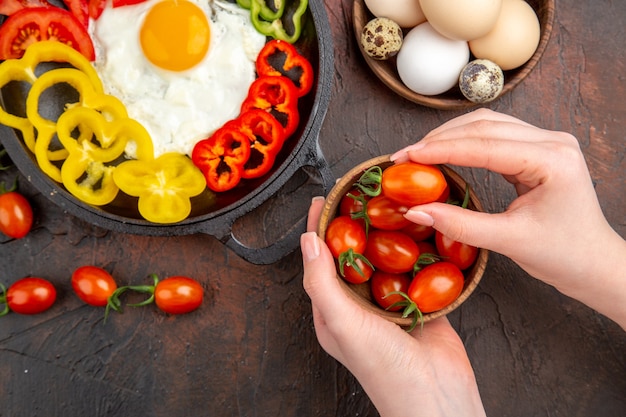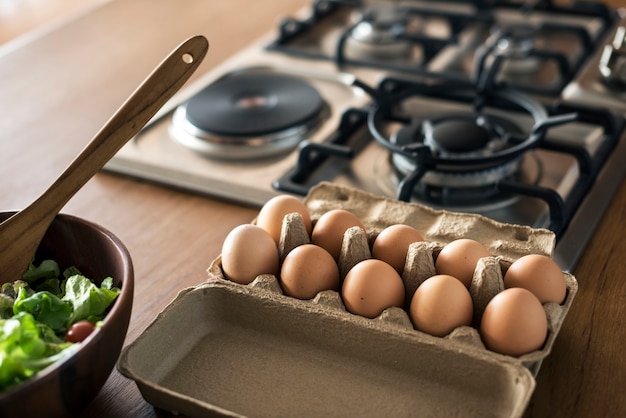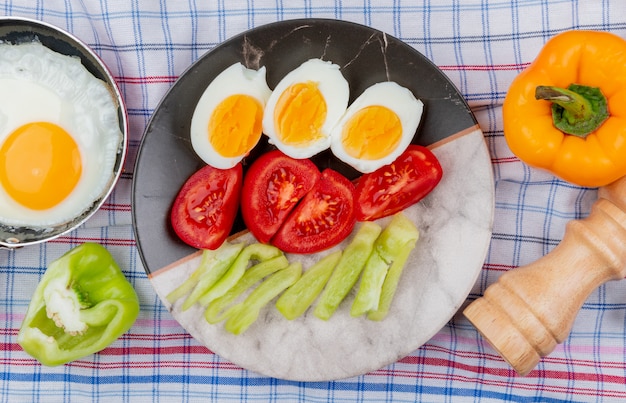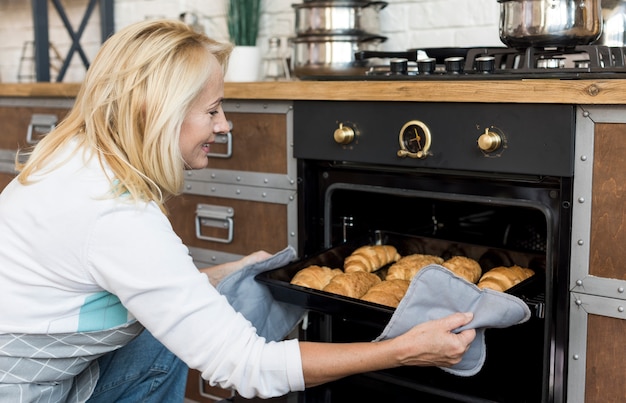Let's face it, we all have our egg preferences. Some crave a runny yolk, others prefer a firm bite. But achieving that perfect egg consistency can be a bit of a culinary mystery, especially when it comes to nailing those temperature ranges. As someone who's spent countless hours perfecting my egg-cooking skills, I'm here to spill the secrets. You'll be surprised how much a few degrees can change the game.
So grab a cuppa, and let's dive into the science, techniques, and tips for making those eggs the star of your breakfast, lunch, or dinner. We'll explore the perfect temperatures for each cooking method, from a delicate poached egg to a perfectly firm hard-boiled one. Get ready to become an egg-cellent chef!
(Part 1) The Science Behind the Shell: Understanding Eggs

A Glimpse Inside: Egg Anatomy
Eggs are truly remarkable. They're not just a simple breakfast staple; they're a fascinating blend of nature's goodness. The white, or albumen, is mostly water and protein. When heated, those proteins unravel and bond together, creating that firm, set texture. The yolk, on the other hand, is packed with fats and proteins. It's the fat that gives it that luscious, creamy texture, and the protein that helps it solidify with heat, though not as quickly as the white.
Temperature: The Key to Egg Transformation
Now, here's where the magic happens. Temperature is the maestro of this culinary orchestra. It dictates how those proteins in the white and yolk react. Gentle warmth creates a delicate coagulation, resulting in a tender, runny yolk. Higher temperatures mean a faster, more thorough transformation, leading to a firmer yolk and set white.
(Part 2) The Boiling Point: A Temperature Spectrum

Water's Role: From Simmer to Boil
You know how water boils at 100°C (212°F)? Well, it's not just about reaching that point. The different temperature zones within that boiling process are what determine how your egg cooks. Imagine a temperature spectrum, each zone offering a unique egg experience:
- Low Temperatures (60°C - 85°C/140°F - 185°F): Think of this as a slow and gentle dance. It's ideal for poaching or cooking eggs in a water bath. The proteins coagulate delicately, creating a soft, silky texture. It's like a whisper of heat, perfect for those who love a runny yolk and a tender white.
- Medium Temperatures (85°C - 95°C/185°F - 203°F): This zone is perfect for simmering. It's where the magic of soft-boiled eggs happens! The white firms up, while the yolk remains deliciously runny, waiting to ooze out onto your toast.
- High Temperatures (95°C - 100°C/203°F - 212°F): This is the classic boiling point. It's fast and efficient, cooking the egg quickly and thoroughly, resulting in a firm white and a hard-boiled yolk. This is the go-to for those who prefer a firmer bite.
Your Temperature Ally: The Kitchen Thermometer
Now, I know what you're thinking: "A thermometer? Really?" But trust me, it's a game-changer. Just like a chef's trusty knife, a thermometer gives you complete control over the cooking process, ensuring consistent results. No more guessing or hoping for the best! Invest in a good quality thermometer, and you'll be amazed at how much more precise your egg cooking becomes.
(Part 3) cooking techniques: Mastering the Art of Egg Preparation

1. soft-boiled eggs: The Perfect Runny Yolk
Ah, soft-boiled eggs, the ultimate comfort food. They're a delight for breakfast, a satisfying snack, or even a sophisticated brunch dish. To achieve that dreamy, runny yolk with a gently set white, simmer those eggs in a pan of water for a specific time.
| Time | Yolk | White |
|---|---|---|
| 2 minutes | Very runny | Slightly set |
| 3 minutes | Slightly runny | More set |
| 4 minutes | Slightly firmer | Almost completely set |
| 5 minutes | Firmer | Fully set |
Remember, these are just guidelines. The size of your eggs can impact cooking time, and everyone has their own perfect level of doneness. Don't be afraid to experiment! And when your eggs are done, plunge them into a bowl of ice water. This stops the cooking process, and also makes peeling a breeze.
2. poached eggs: The Art of Gentle Cooking
Poaching is a bit of a culinary dance. It's about gentle cooking, coaxing the egg whites to set delicately while leaving the yolk luxuriously runny. The key is to maintain the water temperature just below simmering, around 85°C (185°F). It's a delicate balance, but well worth the effort.
A little tip I've learned: add a splash of vinegar to the water. It helps the whites coagulate faster and prevents them from spreading too much, resulting in a beautifully formed egg. And before adding the egg, gently swirl the water to create a whirlpool. This helps the egg settle into the center, creating a more even cook.
Poaching takes a bit of practice, but once you master the art, you'll be serving restaurant-quality poached eggs in no time!
3. hard-boiled eggs: A Classic for a Reason
Hard-boiled eggs are a timeless classic. They're versatile, a staple for sandwiches, salads, and even a quick snack. For that perfect hard-boiled egg, bring a pot of water to a boil, then gently lower the eggs in. Reduce the heat to a simmer and cook for 8-10 minutes, remembering that longer cooking time results in a firmer yolk.
To make peeling a breeze, add a teaspoon of salt to the boiling water. This strengthens the egg white, preventing it from sticking to the shell. After cooking, immediately plunge the eggs into ice water to stop the cooking process.
4. scrambled eggs: A Culinary Canvas for Creativity
Scrambled eggs are a blank canvas, waiting for your culinary masterpiece. Whether it's cheese, herbs, or vegetables, you can add your favorites to create a unique breakfast treat. The key is low and slow heat, allowing the eggs to cook gently, avoiding that dry, rubbery texture.
I always whisk my eggs with a splash of milk or cream. It adds richness and tenderness, transforming the texture into something truly decadent. Cook them in a nonstick pan over low heat, stirring constantly until just set, but still slightly runny. Remember, don't overcook them, or you'll be left with a less than desirable result.
(Part 4) Tips and Tricks: From a Seasoned Egg Chef
1. Freshness Matters: Age and Texture
fresh eggs, those just laid, are ideal for boiling and poaching. Their whites are thicker, resulting in a smoother, more consistent cook. For scrambling, older eggs are a good choice. They tend to be creamier, thanks to a larger yolk-to-white ratio.
2. The Art of Peeling: Making It a Breeze
I've tried countless methods for peeling hard-boiled eggs, but here's the one that consistently delivers: after boiling, crack the shell all over the egg. Then, gently roll it on the counter to loosen the shell further. It peels off like a dream, leaving behind a beautifully smooth egg.
3. Embrace Experimentation: A culinary adventure
Cooking eggs is a fun and exciting journey. Don't be afraid to experiment with different cooking methods and temperatures. You'll be surprised at the delicious results you can achieve, and you might even discover a new favorite technique!
(Part 5) Troubleshooting Common Egg cooking mistakes
1. The Rubber Band Effect: Overcooked Yolks
You know that moment when you bite into a hard-boiled egg, and the yolk is tough and rubbery? That's overcooking. To avoid this, cook your hard-boiled eggs for a shorter time, or stick to a lower temperature for a softer yolk.
2. The Runny White: Undercooked Whites
If the whites of your boiled eggs are runny, it means they haven't cooked long enough. Increase the cooking time by a minute or two next time, and they'll be perfect.
3. The Ugly Spread: Poaching Problems
Poaching can be tricky, but a few simple tweaks can make all the difference. Make sure your water is at the right temperature (85°C/185°F), add a splash of vinegar, and gently swirl the water before adding the egg.
(Part 6) Eggcellent Variations and Recipes: A World of Egg-cellent Dishes
1. Eggs Benedict: A Classic Brunch Treat
Eggs Benedict is a brunch classic, a symphony of flavors. Poached eggs are served on toasted english muffins, topped with Canadian bacon or ham, and bathed in a creamy hollandaise sauce. It's a decadent treat, perfect for special occasions or a luxurious weekend brunch.
2. Shakshuka: A Middle Eastern Delight
Shakshuka, a dish with roots in North Africa and the Middle East, is a vibrant and flavorful experience. Eggs are poached in a spicy tomato sauce, often with peppers, onions, and garlic. It's a hearty and satisfying meal, perfect for any time of day.
3. deviled eggs: A Party Favourite
Deviled eggs are a party staple. They're surprisingly easy to make and always impress guests. Hard-boiled eggs are halved, the yolks are scooped out and mashed with mayonnaise, mustard, and seasonings, then piped back into the egg whites. It's a delicious and visually appealing appetizer.
(Part 7) Beyond the Kitchen: Eggs in Culture and History
Eggs: A Symbol of Life and Renewal
Eggs hold a special place in many cultures, representing life, renewal, and fertility. In ancient Egypt, eggs were associated with the goddess Isis, believed to have been born from an egg. Many cultures also incorporate eggs into their celebrations and festivals, symbolizing new beginnings and good fortune.
A Global Culinary Staple
Eggs are a universal food, enjoyed around the world in countless dishes. From the French omelet to the Japanese tamagoyaki, eggs are a versatile ingredient that can be prepared in countless ways. Their adaptability and flavour make them a true culinary treasure.
(Part 8) FAQs: Your Egg-spert Guide
1. What's the Difference Between Brown and White Eggs?
The colour of the shell doesn't affect the taste or nutritional value of the egg. It's simply determined by the breed of hen. Brown eggs are often associated with free-range hens, but it's always best to check the packaging for information about the hens' living conditions.
2. How Long Can I Store Eggs in the Fridge?
Eggs can be stored in the fridge for up to 3-5 weeks after the "best by" date. It's best to keep them in their original carton, which helps to protect them from absorbing other odours in the fridge.
3. Can I Freeze Eggs?
Yes, you can freeze eggs, but it's best to freeze them as a mixture. Separate the yolks from the whites and freeze them separately in airtight containers. You can also freeze whole eggs by beating them with a little salt.
4. Can I Use Eggs that Are Past Their "Best By" Date?
Yes, but it's always a good idea to check the egg's freshness before using it. Crack an egg into a bowl: if the white is clear and the yolk is round and firm, it's still good. If the white is runny or the yolk is flat and spread out, it's best to discard the egg.
5. What's the Best Way to Tell If an Egg is Fresh?
The classic test is to place the egg in a bowl of cold water. If it sinks to the bottom and lies flat, it's very fresh. If it rises slightly, it's still good, but not as fresh. If it floats, it's old and should be discarded.
There you have it, my egg-cellent guide to cooking eggs to perfection. Now, go forth and unleash your inner egg chef! With a little practice and a touch of patience, you'll be whipping up breakfast masterpieces in no time. Remember, every egg is a culinary adventure waiting to be explored, so don't be afraid to get creative!
Everyone is watching

Prime Rib Roast Cooking Time Chart: Per Pound Guide
Cooking TipsPrime rib roast. Just the name conjures images of lavish dinners, crackling fires, and hearty laughter. It’s ...

How Long to Bake Potatoes in the Oven (Perfect Every Time)
Cooking TipsBaked potatoes are a staple in my kitchen. They're incredibly versatile, delicious, and surprisingly easy to m...

Perfect Rice Every Time: The Ultimate Guide to Cooking Rice
Cooking TipsAs a self-proclaimed foodie, I've always been a bit obsessed with rice. It's the foundation of countless cuisi...

The Ultimate Guide to Cooking Asparagus: Tips, Techniques, and Recipes
Cooking TipsAsparagus. The mere mention of this spring delicacy conjures up images of vibrant green spears, crisp and burs...

Ultimate Guide to Cooking the Perfect Thanksgiving Turkey
Cooking TipsThanksgiving. Just the word conjures up images of overflowing tables laden with delicious food, the scent of r...
